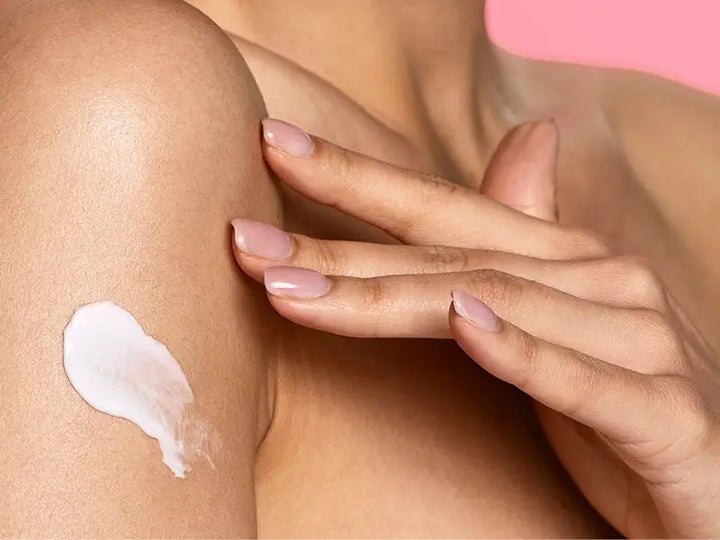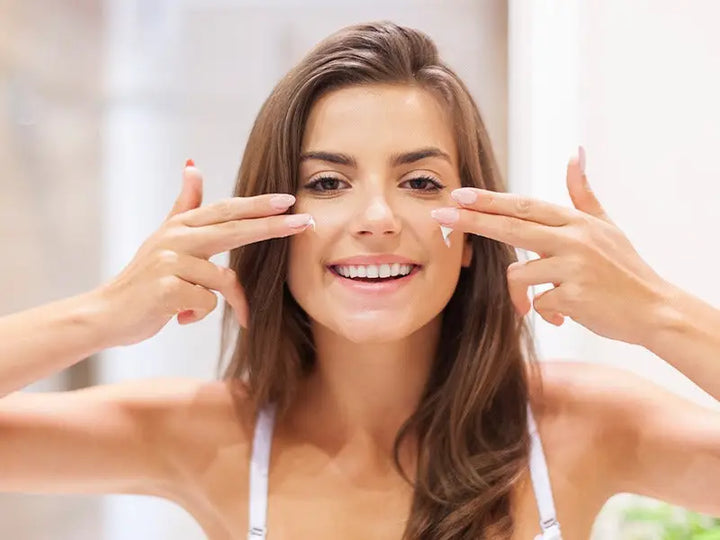Proven to erase years off your appearance, retinol was first exclusively used for creams but is now one of the most popular anti-ageing ingredients. Favoured by dermatologists and beauty enthusiasts alike, it can be found almost anywhere from everyday skin care holy grails like sunscreen and serums to must-have cosmetics such as powders and lipsticks. In fact, retinol benefits also start appearing on the label list of several eye creams.
By now, you’re probably wondering what this craze for skin care ingredient is all about. Is it really THAT good that almost everyone swears by it? In order to answer all your questions, here are all the facts you should know about retinol—from benefits, usage, application tips, to other relevant information—and why your skin needs this anti-ageing ingredient.
All Your Questions About Retinol Answered
WHAT IS RETINOL?
Retinol is made from vitamin A, which can be found in carrots, eggs, and sweet potatoes.
When applied topically, retinol converts to retinoic acid as soon as it makes contact with the specialised enzymes found in the skin. However, these retinoic acids tend to be harsh to the skin. As such, it’s best to use retinol in small amounts (which is found in creams and serums) because it’s more gentle to the skin.
RETINOIDS, RETINOL, AND RETIN-A: WHAT’S THE DIFFERENCE?
Retinoid is simply an umbrella term that covers both over-the-counter retinol and prescribed retinoic acids. To further guide you what these three related terms mean, here’s a breakdown of their differences.
- Retinoid – It is a large class of anti-ageing compounds that are derived from vitamin A. This includes actual retinol and both natural and synthetic derivatives. Retinoid can regulate cell growth and division which helps clear away acne, fine lines, and hyperpigmentation.
- Retinol – A type of retinoid, it is typically added as an anti-ageing ingredient to most topical over-the-counter cosmetic and skin care products. Retinol promotes the skin’s renewal by boosting collagen production. It usually has lesser potency which means that one cannot immediately see substantial effects.
- Retin-A – Also known by its generic name, tretinoin, it is a prescription-only retinoid. As such, its effects on the skin are stronger and more powerful which may lead to irritation. It is also potent enough on its own so the results of using Retin-A can be achieved by only a few weeks.
WHICH ONE SHOULD I USE THEN?
Doctors and dermatologists recommend starting out with over-the-counter retinol products first. This is due to the fact that patients who have never used this skin care ingredient may experience intense side effects from prescription-strength retinol.
Determining which type of retinoid you should use can also depend on your skin type and tolerability. For instance, those with oilier skin types can actually benefit from prescribed Retin-A. However, individuals with dry and sensitive skin types are advised to stick with mild retinol-based products first. The key here is not surprising your skin with a brand new formula but instead letting it adjust properly. You can always switch to stronger and more powerful Retin-A after your skin gets well acquainted with the effects of retinol.
WHAT DOES RETINOL TREAT?
While extremely gentle to the skin, retinol is proven to be effective in targeting several skin problems.
It can help boost collagen production as well as aid in cell turnover. This not only improves skin tone and texture but also reduces the appearance of fine lines and wrinkles. Retinol can also regulate oil production in the skin which may lead to less acne breakouts.
ARE THE RESULTS OF USING RETINOL INSTANTANEOUS?
Unfortunately, the effects of retinol benefits in your skin may not show up until four weeks to three months of continued use of this particular anti-a geing ingredient.
As over-the-counter remedies, retinol works more gradually compared to prescribed Retin-A. Since its formula needs to be converted to retinoic acid first before it can be put to use, the results of using retinol cannot be achieved instantaneously.
With that being said, once retinol benefits start to show up in the skin, you can expect to see accumulative results over a shorter period of time.
CAN ANYONE USE RETINOL?
Almost everyone can enjoy retinol benefits—whether you’re suffering from dull, sagging skin or an acne-ridden complexion. However, it doesn’t work out as equally for some people.
In particular, individuals with eczema, rosacea, and other hyperpigmentation problems are advised to stay away from this anti-ageing ingredient. This is due to the fact that retinol may cause further inflammation and therefore, worsened symptoms of the particular skin condition one might have.
Pregnant and breastfeeding women should also avoid retinol products. The ingredient can bypass the placental barrier which can potentially lead to serious birth defects.
Tip: If you are pregnant, it’s best to consult an obstetrician before starting or continuing the use of retinol products.
WHEN SHOULD I BEGIN USING RETINOL IN MY SKIN CARE ROUTINE?
It’s best to incorporate retinol products in your skin care routine as early as the age of 30. This is usually the time when faint fine lines, laugh lines, wrinkles, and other early signs of ageing start to appear on the skin. As such, starting out early by using retinol products can greatly help prevent such ageing indicators from developing so quickly.
HOW DO I APPLY RETINOL?
Retinols—whether it’s found in a cream or serum—should be applied in a pea-sized amount at night. When used during the day, it can cause potential harm to the skin. This is due to the fact that some types can break down the sun’s rays and make the skin even more sensitive. Exposure to UV light can also render retinol benefits less effective. And while others are photostable (they won’t break down in the sun), it’s still best to use retinol during the night just to be safe.
Prior to the application of retinol, cleanse the skin first using a gentle facial wash instead of an exfoliator. Avoid over-scrubbing as it can further aggravate the condition of your skin. Allow at least 20 to 30 minutes for the product to be absorbed in your skin before applying another product on top.
Tip: It’s a must to apply moisturiser before layering on retinol-based products. It will act as a protective barrier for the skin in order to minimise irritation.
HOW OFTEN SHOULD I APPLY RETINOL?
Since retinol is a powerful ingredient that can surprise your skin, it’s a must to introduce retinol slowly into your daily skin care routine. Doing so would help your skin adjust accordingly and build enough endurance to fully absorb and maximise retinol benefits.
You should start by adding retinol into your nightly beauty regimen for one to two times during the first week. Then steadily increase its usage, depending on how your skin would react. If you experience any flaking or peeling, you should immediately limit its use once per week.
You can also base the amount of your usage to your age. For instance, those who are in their 30s are advised to use retinol for 3 to 4 times a week. Individuals between the ages of 40 and 60 can benefit from the application of retinol every other day.
WILL I EXPERIENCE SIDE EFFECTS FROM USING RETINOL?
The overuse of retinol in your skin care routine can lead to several side effects.
Redness and burning are usually common. However, acne breakouts, peeling skin, and red scaly patches can also appear when the skin gets aggravated by the excessive application of this anti-ageing ingredient.
Fortunately, all of these side effects can be avoided by limiting its usage. Always remember that a little goes a long way and can still benefit your skin just the same—you just have to be patient. It’s also best to contact a doctor or dermatologist if you’re unsure of its effects.
WHY SHOULD I USE RETINOL?
Retinol comes from a natural vitamin and is packed with numerous benefits for the skin. If you’re still having doubts in using this particular anti-ageing ingredient, read on to know the reasons why you should use retinol.
- Retinol is accessible – As one of the most popular skin care ingredients today, you can avail retinol practically almost everywhere—from creams, serums, masks to foundation, lipsticks, and powders.
- Retinol is relatively cheap – This anti-ageing ingredient is available at a range of price points. So while there are a lot of really expensive skin care products containing retinol, there are just as much cheaper drugstore alternatives which provide the same (if not better) results. Prescribed retinoids such as Retin-A are also relatively affordable considering all the benefits it gives.
- Retinol is effective – With its addition to your daily skin care routine, you can reap a lot of benefits from retinol. This includes smoother skin, reduced appearance of fine lines and wrinkles, and an overall younger-looking complexion. Read on to discover more retinol benefits.
10 ESSENTIAL BENEFITS OF USING RETINOL FOR THE SKIN
1. PREVENT WRINKLES
Thanks to its ability to stimulate collagen production in the skin, retinol is proven to be effective when targeting wrinkles, laugh lines, crow’s feet, and other fine lines. This increased amount of collagen in the skin encourages fibroblasts which keeps the skin supple and shapely.
2. BRIGHTEN DULL SKIN
Aside from plumping the skin, retinol’s ability to trigger collagen renewal can also help strip away dead skin cells, revealing the bright complexion you have underneath.
3. EVENS OUT COMPLEXION
Another retinol benefit you can get is an even skin. As a vitamin A derivative, retinol-based products can clear away any dark spots which ultimately leads to a flawless face.
4. PROVIDE ELASTICITY
Retinol can also stimulate the production of elastin in your skin which helps you achieve a firmer-looking skin. For instance, you don’t have to worry about your skin sagging whenever you pinch your cheeks as elastin can retain its normal shape.
5. REDUCE THE APPEARANCE OF BIG PORES
The appearance of visible pores in your skin can make you feel insecure and self-conscious. Fortunately, applying retinol on your face can shrink its size overtime.
Did You Know? Retinol can also target pore congestion, leaving you with clearer and smoother-looking complexion.
6. MINIMISE ACNE BREAKOUTS
Clogged pores is usually the number one cause of acne breakouts. But with retinol’s ability to successfully unclog your pores, expect to see major improvements in the condition of your acne-prone skin.
7. ELIMINATE DARK CIRCLES
If you’ve been pulling all-nighters lately due to pressure at work, you might start to notice the appearance of dark circles under your eyes. Applying an eye cream with retinol can improve its condition by rebuilding dermal collagen and contribute to skin volume and firmness.
8. SLOW DOWN SIGNS OF AGEING
As you age, you are constantly exposed from the sun, pollution, and other external aggressors that can keep you from looking youthful. Fortunately, one of the many retinol benefits include protecting your skin from such harmful factors. This ultimately helps you enjoy a younger-looking complexion for as much as you can.
9. TREAT VARIOUS SKIN CONDITIONS
Besides its anti-ageing properties, retinol can also help alleviate various skin conditions such as psoriasis and warts. In fact, one of the retinol benefits is slowing down cell growth which really limits the build-up of the thick, red or white, patches on the skin.
Retinol is also proven to be effective in treating warts as it effectively disrupts its cell growth. This ultimately leaves you with clearer and flawless skin.
10. USE ALONGSIDE BENEFICIAL SKIN CARE INGREDIENTS
Retinol benefits can perfectly work alongside other proven and effective skin care ingredients like vitamin C and E as well as AHA or BHA exfoliants. As such, using them side-by-side in your skin care routine can actually yield better-looking results.
Did You Know? Mixing retinol with vitamin C helps this anti-ageing ingredient penetrate the skin deeper by eliminating the free radicals.
ALSO READ: The Awesome Truth About Vitamin C for Skin Care
Getting your hands on topical retinol used to be very difficult but now, you can easily find it in almost every skin care product and even cosmetics. As one of the most popular anti-ageing ingredients in the market, it’s hard to ignore the numerous retinol benefits you can enjoy.
Liked this article? Check our lifestyle magazine for more information about other skin care essentials.
Maintain a younger-looking skin today by checking out Alyaka’s selection of anti-ageing beauty products!













![Ayuna Velo [x] 8-in-1 Defending Superserum 50ml](http://www.alyaka.com/cdn/shop/files/velox-back-1024x1024.webp?v=1734468271&width=1100)





